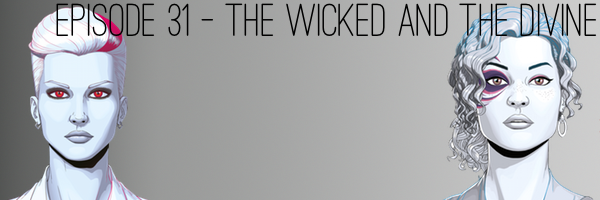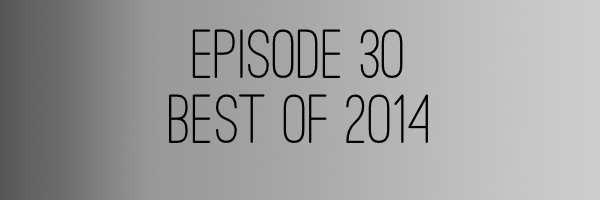Did you ever have a place you always went to on family holidays? Passing landmarks and well-worn jokes in an over-hot car on the way, running down to a beach, making a campfire like you always did, seeing those friends you somehow never wrote to in the autumn?
No, nor did I. Or at least, never quite. But it’s a powerful image. That familiar childhood holiday; lazy, comfortable little memories repeating in rose-tint, until this one summer.
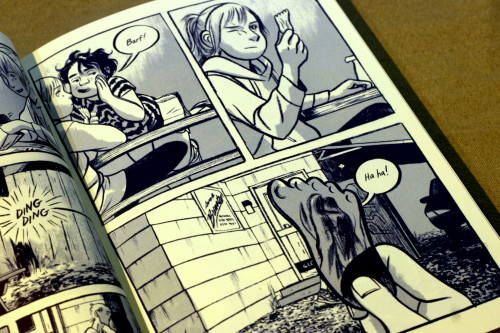
I love that cadence. The tone of the title hits it spot on, and it’s carried through on the voice of the book – This One Summer, when…
When what, exactly? The lazy version would be “when childhood ended”, and plenty of coming-of-age reminiscence tales give us that. But This One Summer ducks the temptation, playing out instead the little heartaches and explorations of its childhood scenes against a more conventional drama. The big stuff, the sex and death stuff, happens around the protagonists, and we see it largely as they do, like some half-expected storm over the beach.
A snatch of the jacket blurb talks about This One Summer having "raised the bar for young adult comics". I haven't read enough others to know if that's true, but it's certainly a fine book. There are shades here of To The Lighthouse, sketched into the lives of contemporary teenagers. It's close and intimate, fraught by degrees, and full of all those little secret tensions of childhood's drama.
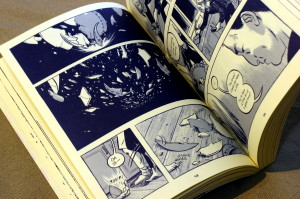 In This One Summer Rose's family have come, once again, to Awago Beach. She meets up, once again, with Windy and her mother. They pass the days, but things are fraught. Rose's family are forever on the edge of an argument; tension is vivid. Her parents' desire to have another child hangs over them, half negotiated. Rose's mother is on edge; something has happened. At the denouement we learn that last year's holiday is where she miscarried. Her emotional trajectory runs in parallel to Rose's, but more reserved and somehow further out.
In This One Summer Rose's family have come, once again, to Awago Beach. She meets up, once again, with Windy and her mother. They pass the days, but things are fraught. Rose's family are forever on the edge of an argument; tension is vivid. Her parents' desire to have another child hangs over them, half negotiated. Rose's mother is on edge; something has happened. At the denouement we learn that last year's holiday is where she miscarried. Her emotional trajectory runs in parallel to Rose's, but more reserved and somehow further out.
Rose escapes the tension in part by renting horror movies from the teenage clerks at the convenience store. Moody and introverted, she fixates on Duncan ("the Dud"), who comes to play out his own symmetrical drama. Where her mother's inability to have another child, and her parents' stilted, fraught processing of the trauma of the miscarriage jars at the family from one side, the unwanted pregnancy of Duncan's girlfriend intrudes from another. Rose's parents can't find the words to talk to each other. Duncan won't talk to Jenny. Rose watches it all with something like voyeurism diluted through bewilderment.
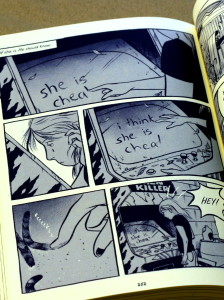 She convinces herself that Jenny might be cheating, must be culpable, must be shamed. She dips a toe into the full grubbily-internalized revulsion of patriarchy, trying to convince herself that Duncan might not be an utter shit. It's a brilliant portrayal of adolescent obsession, and Windy, just enough her junior to meet it all with bafflement, and shrugging off gender norming so casually, makes a splendid contrast medium.
She convinces herself that Jenny might be cheating, must be culpable, must be shamed. She dips a toe into the full grubbily-internalized revulsion of patriarchy, trying to convince herself that Duncan might not be an utter shit. It's a brilliant portrayal of adolescent obsession, and Windy, just enough her junior to meet it all with bafflement, and shrugging off gender norming so casually, makes a splendid contrast medium.
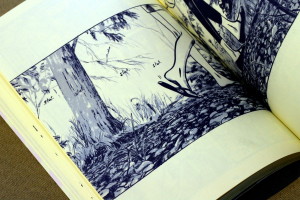 I'm not going to concentrate on it, but the play of gendered socialization across adolescence is one of the book's quieter but more interesting themes. There's an almost surreal feeling to Windy and Rose fantasizing about how big their breasts will be, an oddness they half acknowledge, jiggling and laughing at "bazooms" and "sexy ta-tas". On the other side, that in Awago "all the girls here are sluts" is a frequent casual assertion from Rose, and it's not her being rebuffed by either Windy or her mother for this that makes it look silly. Oh, they're right to call her on it, and Windy in particular has a spectacular scene doing so. But more acutely it's the way this assertion creeps in from nowhere, looks fragile and perfunctory, that makes the point. Rose's slut shaming is nonsensical, out of context, a kind of social judgement version of an infant parading around in ill-fitting adult clothing. Her reaction to being called on it is commensurately bratty, first an angry "OK, Mom. Guess I'd better not say SLUT in front of you, or you'll be all offended", then a painful attempt to brazen it out with "...kidding?".
I'm not going to concentrate on it, but the play of gendered socialization across adolescence is one of the book's quieter but more interesting themes. There's an almost surreal feeling to Windy and Rose fantasizing about how big their breasts will be, an oddness they half acknowledge, jiggling and laughing at "bazooms" and "sexy ta-tas". On the other side, that in Awago "all the girls here are sluts" is a frequent casual assertion from Rose, and it's not her being rebuffed by either Windy or her mother for this that makes it look silly. Oh, they're right to call her on it, and Windy in particular has a spectacular scene doing so. But more acutely it's the way this assertion creeps in from nowhere, looks fragile and perfunctory, that makes the point. Rose's slut shaming is nonsensical, out of context, a kind of social judgement version of an infant parading around in ill-fitting adult clothing. Her reaction to being called on it is commensurately bratty, first an angry "OK, Mom. Guess I'd better not say SLUT in front of you, or you'll be all offended", then a painful attempt to brazen it out with "...kidding?".
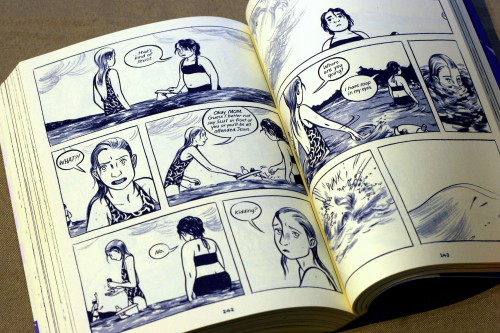
That's a fine one-two punch in the dialogue. The "all" skewers her misunderstanding and her age, then the "Kidding?" is powerfully referential. It's just what she's earlier castigated Windy for doing. It's a specific childishness she has beef with, and resorting to it is a painful low point. The panel is brutal. Windy just walks away.
This dynamic between Rose and Windy as they negotiate incipient adolescence is the soul of the book, and its idiom is pitch perfect.
One of its gorgeous subtle devices is the contrast, (not only of dialogue, but of readiness of self expression) between Rose and Windy, and those around them. It's set out on a spectrum, shifting almost linearly with age. They're frothy, tempestuous, dancing, jumping, rowing briefly and suddenly, subsiding fast. All that high-amplitude early adolescent emotion that's yet to be hidden behind learned reticence. Jenny, Sarah, "The Dud", and the older teens sit further along, more muted, bottling it up, not talking, exploding hard. Rose's parents are quieter still, draw more conventionally from suburban tragedy. It's all tiny details and inflections, talking but not talking, and big lingering trauma.
There is, of course, a cantankerous granny who has passed out the other side of all this, wryly affecting cranky and getting to the point.
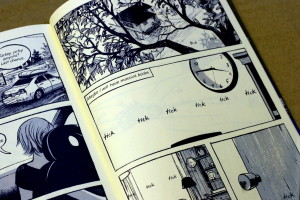 It's tempting to suggest that the message in This One Summer is that it won't be ok when you're older: that everything's still huge and complicated and overwhelming. But that does feel a little simplistic, and Rose's family do find a kind of resolution. Her mother dives into the ocean she's been terrified of, to save Jenny from drowning. What would be heavy symbolism is then nuanced neatly, as Rose and Windy's mothers finally talk it all out while the household sleeps.
It's tempting to suggest that the message in This One Summer is that it won't be ok when you're older: that everything's still huge and complicated and overwhelming. But that does feel a little simplistic, and Rose's family do find a kind of resolution. Her mother dives into the ocean she's been terrified of, to save Jenny from drowning. What would be heavy symbolism is then nuanced neatly, as Rose and Windy's mothers finally talk it all out while the household sleeps.
They find a kind of peace at the end of it all, or at least begin to. The teenagers, perhaps not so much. It's more muted, less certain. And Rose and Windy seem to snap back to form as they prepare for the end of the holiday, but Rose is not quite the same.
It makes a kind of linear sense, then, that the conclusion is time passing in the empty cottage, "tick tick tick tick." and Rose's coda "Boobs would be cool."
She's learned a little, but time is passing, and incipient sexuality overshadows more and more. The family leaves Awago somewhat reconciled, more warm and in familiar patterns, but the ticking clock in the empty room teases us with next summer, and the summer after, with "massive boobs" and whatever may happen.
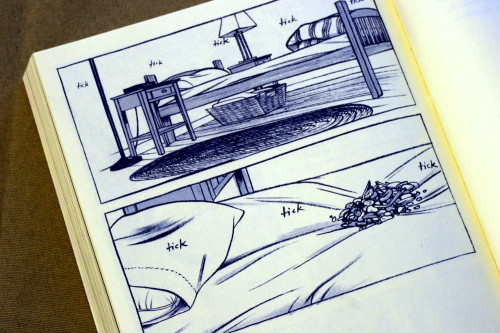
This One Summer is written by Markio Tamaki, and drawn by Jillian Tamaki. It made a huge splash at TCAF, it's getting great press, and you should probably buy it.




